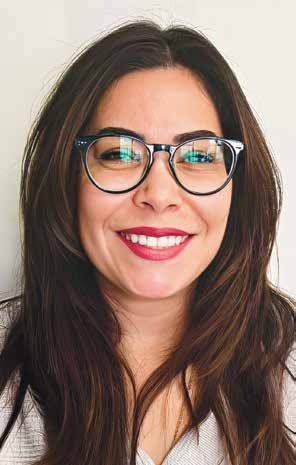A Special Kind of Therapy
June 14, 2024
How members are taking their case to Albany to increase access to Creative Arts Therapies.
Some trauma is buried too deeply to be spoken about. If the emotional pain is too intense, the sufferer may not be able to bring it to the surface using talk therapy. Small children and those with cognitive disorders may not even have the language to describe their pain in words.
That is where 1199 licensed creative art therapists come in. These specially-trained professionals know how to use art, music, drama, dance and even poetry to draw people out and help them come to terms with emotional distress.
Creative arts therapies are especially effective for treating people who have lived through trauma and for people who struggle to benefit from talk therapy. This includes children, teenagers, and those with severe psychiatric needs.

Her therapeutic modality is music and she described a case where soothing music was able to calm a newborn baby with brittle bone disease, which in turn, allowed his mother to feel safe enough to hold him again.
But creative arts therapy is currently out of reach for many people who would greatly benefit from it because it is not covered by health insurance programs, including Medicaid.
That is why 1199SEIU is urging legislators to support a bill (S6362/ A6173) in the New York State legislature that would allow LCAT services to be covered by health insurance— so that New Yorkers can access healthcare that uniquely suits their needs. The bill mandates that health insurance policies must cover outpatient treatment by all mental health practitioners.
On April 17, members showed up in force in Albany to speak directly with their elected leaders about the issue. As this edition was going to press, 1199ers were still actively calling their elected representatives, urging them to support the legislation.
“I don’t think all members realize that if we have a problem that stems from decisions being made by elected officials, we can reach out to the Union’s political action team for support,” said Asch-Ortiz. “When 1199 jumped on board, we were able to work collectively, and it moved everything for our coalition and helped us to navigate the complicated world of New York State government in Albany. By working together with our Union, we have so much more power at the table. As a proud 1199 Delegate, I am acutely aware of the necessity for collective organization and power.”
The lack of insurance coverage is both detrimental to the profession and those needing care, Asch-Ortiz pointed out.
“Too often, therapy is written off as a luxury for the affluent. However, this misconception could not be further from reality,” she said. “At NewYork-Presbyterian, we not only advocate for ourselves, but also for our communities and the individuals under our care, recognizing that our collective strength surpasses the sum of our individual efforts.”
Melissa Ulloa, is an 1199 LCAT at the Family PEACE Trauma Treatment Center, also in the NewYork Presbyterian network. She works with children from birth to 5 years-old, some of whom are in foster care or living in the shelter system. “Some of the trauma these children experienced may have happened before they could talk,” she said. “Using art therapy, we can help them come to terms with it on a sensory level.”
Said Ulloa, “It is so important to make sure that your voice is heard in your community so that you can be a part of positive change.”
There is a mental health crisis in New York City—with not nearly enough providers to cope with the need. There are 2,000 LCATs across the state, which are a vital resource that must be fully utilized.

